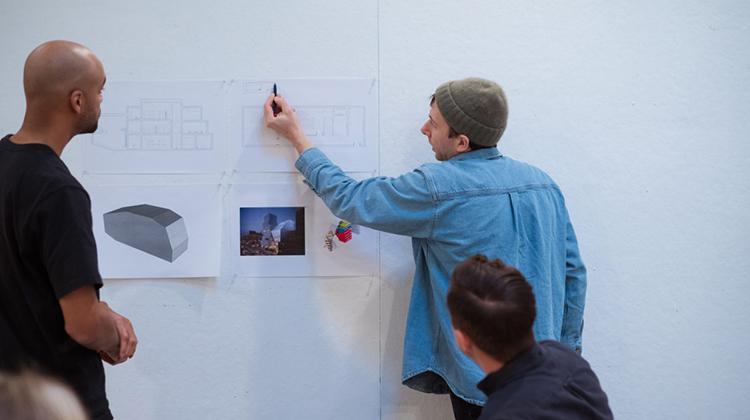Two Stories of Philanthropy in the Department of Architecture

Philanthropy helps make the MIT School of Architecture and Planning a leader in education, research, and innovative practice. Photo: Gretchen Ertl
Named professorship and significant discretionary funds are “gifts of confidence”
TWO SIGNIFICANT GIFTS TO THE MIT SCHOOL OF ARCHITECTURE AND PLANNING (SA+P) offer different but equally transformative examples of philanthropic leadership in action. In December 2021, Alan G. Spoon ’73, chair of the Department of Architecture Visiting Committee, and his wife, architect Terri Spoon, established the Terri and Alan Spoon Professor of Architecture and Climate—the second full professorship in the department since 1978—and the Spoon Climate Studio. In September 2022, Berkeley Investments, founded by visiting committee member Young K. Park ’71, contributed discretionary funds to strengthen and enrich the student experience in architecture.
Both gifts are enabling the architecture department and SA+P to remain at the leading edge of education, research, and innovative practice while navigating a challenging financial climate.
Prioritizing climate-related research in architecture
“The climate crisis requires many important shifts in building and construction,” says professor and architecture department head Nicholas de Monchaux. “As the home of the first professional training architecture program in North America, and the home of pathbreaking research in building today, MIT is well positioned to be a leader in addressing this existential challenge.” Yet funding for this work lags far behind the need, he notes, making gifts like the Spoons’ particularly crucial.
Christoph Reinhart, professor and director of the Building Technology Program and the Sustainable Design Lab, has been named the inaugural Terri and Alan Spoon Professor of Architecture and Climate.
Caitlin Mueller ’07, PhD ’14, SM ’14, associate professor of building technology, and Sheila Kennedy, professor of architecture, were chosen as co-leaders of the inaugural Spoon Climate Studio and will lead a series of workshops and studies beginning in 2024 that will offer a critical cultural inquiry into the modern development of standardized building construction materials.
“The Spoons’ gift will be a catalyst in seeding important climate-related research in the Department of Architecture that could not happen otherwise,” says de Monchaux. “It reflects Alan’s sense of service to MIT and the keen interest that Alan and Terri have for unlocking our department’s potential to face the largest contemporary challenges.”
“A gift of care” to ensure an excellent student experience
At a meeting of the Architecture Visiting Committee in April 2022, de Monchaux spoke about the robust student experience the department aims to provide as well as the challenges it faces in meeting that aspiration, including the rising cost of living and inflation and supporting an increasingly economically diverse student body. Committee member Park, an SA+P alumnus, was inspired to help.
“Members of the visiting committee are able to get an unvarnished glimpse at the inner workings of SA+P departments,” says Park. “Amid the transformative achievements of the past year, we were also made aware of continuing resource gaps, including the ever-increasing expenses borne by graduate students and PhD candidates. Berkeley Investments’ multiyear funding commitment is designed to address this gap, and we hope it will be a useful complement to traditional capital funding.”
The gift will be used to avoid charging specific fees to students for travel, printing, and modeling and prototyping in their studies. “It will expand student access and empower them to use our facilities and workshops. This is incredibly important during a time of budgetary challenges. For students, it’s a gift of care that will enhance their experience.”
Though the designations of these two gifts are quite different, de Monchaux sees an important link between them. “What these gifts share is a spirit of curiosity and generous listening. Both gifts are connected to individuals who have given significant time and service to MIT over the years” and who appreciate the importance of addressing the climate crisis in the built environment and supporting an ever-more diverse student population. “These are remarkable gifts of confidence in our work and priorities.”


